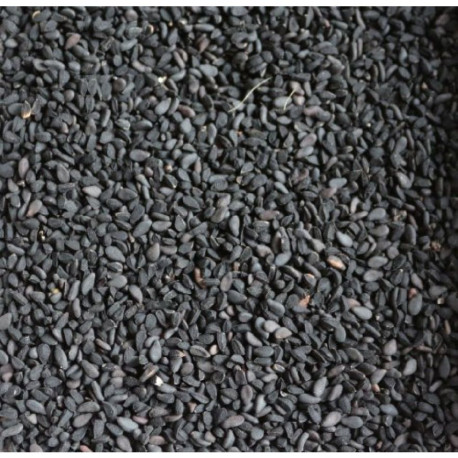



Reference: 169403-1KG
Onion seeds are rich in minerals, vitamins, and antioxidants.
Onion seeds are rich in minerals, vitamins, and antioxidants.
Peeled peanuts are treats highly appreciated by parrots.
They should be distributed sparingly as they are rich.
An ideal food to fill your feeders for wild birds, they will provide the necessary fat for birds to get through the winter more easily.
A favourite of tits and a real delicacy for many birds.
Chia is a sage. It is an annual plant that can reach up to 1 meter in height, with the scientific name Salvia hispanica.
The composition of chia seeds closely resembles that of other mucilaginous seeds like flaxseeds and psyllium. Unlike flaxseeds, chia does not have anti-nutritional factors, which limit the use of flaxseeds without prior heat treatment. Anti-nutritional factors are cyanogenic glucosides or linatins, inhibitors of vitamin B6 that prevent its action. Moreover, chia has a much more pleasant taste than flaxseeds, and birds consume it more readily.
Onion seeds are rich in minerals, vitamins, and antioxidants.
Clover stimulates the immune system and slows down cellular ageing through its excellent antioxidant properties. Rich in vitamins B, C, E and provitamin A.
Dari, also known as sorghum, millet, is a variety of seeds that is attached to millet varieties. The dari has the size of the hemp seed. The seed is native to the warm regions of Australia, Asia, Africa and South America. There are three varieties: white, yellow and red-brown dari. It should be noted that light dari is given more value than red-brown dari. As far as the food value in particular is concerned, there is not the slightest difference. In addition, the red-brown dari is well appreciated by agapornis. Dari can be compared to wheat in terms of starch content. The seed has a favorable composition of amino acids. The protein present in the dari has a particularly high leucine content.
Improves liver and overall health of birds.
Suitable for a wide range of birds, including parrots, canaries, budgerigars, and other exotic birds.
Benefits for birds:
- Liver support.
- Detoxification: Helps eliminate toxins from the liver and improves digestion.
- Strengthening the immune system.
Instructions for use:
Dosage: Add a small amount (usually a teaspoon per day) to the birds' usual seeds. The amount may vary depending on the size and specific needs of the birds. Can be mixed with the birds' daily food.
Precautions:
Store in a cool, dry place, away from moisture and direct sunlight.
Pine seeds are a good source of Phosphorus, Magnesium, Zinc, Manganese, Copper, Iron, Vitamin E, K, B1, B2, B3, B9.
Buckwheat is a nutritious seed often included in the diet of cage and aviary birds.
- Appearance: Buckwheat is a triangular seed, light brown to greyish in colour, with a slightly rough shell.
Benefits for Birds:
- Balanced Nutrition: Buckwheat offers a combination of proteins, carbohydrates, and fibres, contributing to a balanced diet.
- Energy: The complex carbohydrates provide a sustainable source of energy for the birds' daily activities.
- Digestive System: The fibres promote good digestion and a healthy intestinal regulation.
- Proteins: The proteins in buckwheat support growth, reproduction, and the maintenance of muscle mass in birds.
Chenopodium quinoa is an annual plant, one to two meters tall or more. The central stem is cylindrical at the collar and becomes more angular higher. It can be unique or have many ramifications, with a diameter ranging from one to eight centimeters and a height of 0.5 to 3 m, depending on the varieties and growing conditions such as seeding density or fertilization9. Its color is also very variable: uniformly green, green with purple or red streaks, or uniformly red.
The canary seed is a grass, an annual plant up to 1m tall, the seeds being found in the inflorescences. These seeds represent a significant fraction of the majority of bird mixtures.
• Excellent for canaries, European and exotic birds, wavy parakeets and large parakeets.
• EXTRA canary seed has undergone extra cleaning and is of exceptional quality. Unique on the market!
Flaxseed is composed of 40 to 45% oil and 25% protein. Flaxseed keeps very well. In particular, it contains two fatty acids with similar names (and whose root is the word "flax"), linolenic acid (an omega 3) and linoleic acid.
The seed is used in animal feed, especially for laying hens whose omega 3 content is to be increased.
Through these properties, this seed promotes digestion.
These seeds, rich in fats and proteins, are particularly appreciated by wild birds. They will attract redpolls, grosbeaks, goldfinches, black-capped chickadees, sparrows, mourning doves, and a host of other birds to your garden. They are often used as a substitute for rapeseed, which is more expensive.
Spinach seeds contain vitamins A, B1, B2, B3, B7, B9 and C, mineral salts and trace elements. Regular consumption helps to strengthen the feathers.

Onion seeds are rich in minerals, vitamins, and antioxidants.
